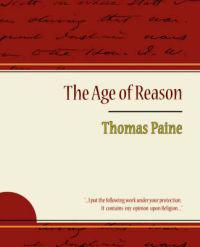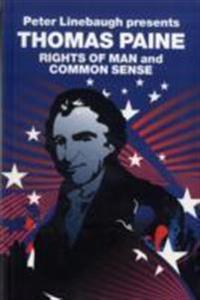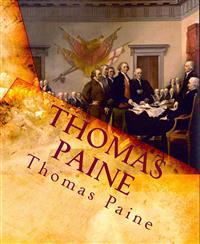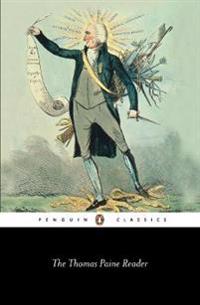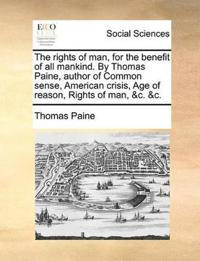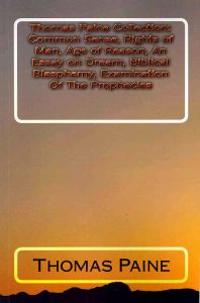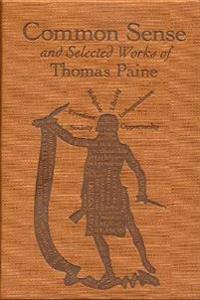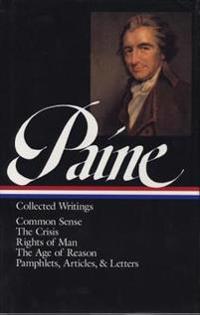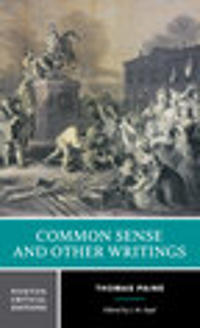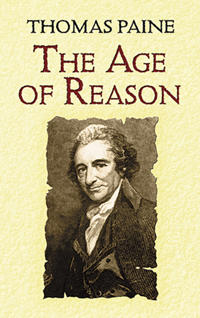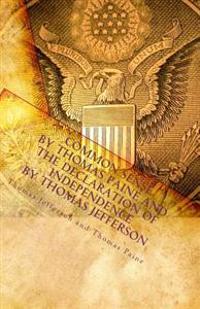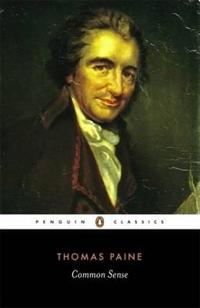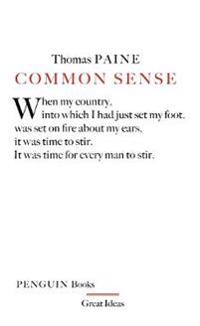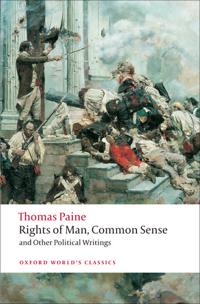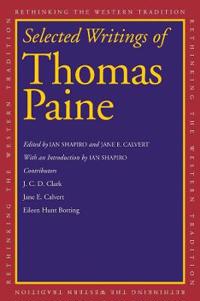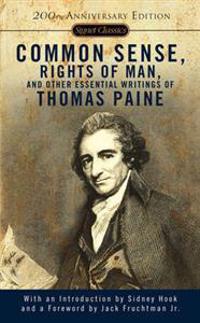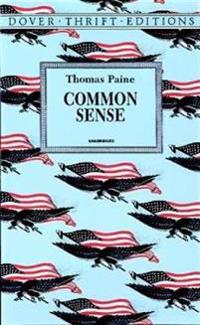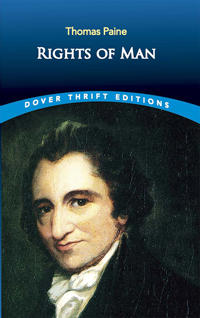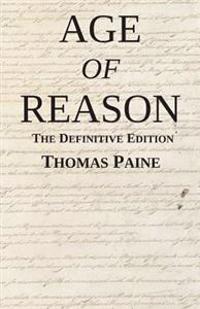The Age of Reason - Thomas Paine (Häftad)
avThomas Paine, Thomas Paine
ISBN: 9781604244274 - UTGIVEN: 2007-11Peter Linebaugh Presents Thomas Paine (Pocket)
avThomas Paine, Jessica (EDT) Kimpell, Thomas Paine
ISBN: 9781844673803 - UTGIVEN: 2009-08Acclaimed historian of revolution introduces the manifesto that inspired the American Revolution, on the 200th anniversary of its author's death. Published to commemorate the bicentennial of Thomas Paine's death, these texts have remained two of the most influential arguments for liberty in politica[...]
The Age of Reason - Thomas Paine (Häftad)
avPaine Thomas Paine
ISBN: 9781603863414 - UTGIVEN: 2010-05Thomas Paine: Common Sense (Häftad)
avThomas Paine, Tom Thomas
ISBN: 9781448657117 - UTGIVEN: 2009-07The Thomas Paine Reader (Pocket)
avThomas Paine, Isaac (EDT) Kramnick, Michael Foot
ISBN: 9780140444964 - UTGIVEN: 1987-12This major collection demonstrates the extent to which Thomas Paine (1737-1809) was an inspiration to the Americans in their struggle for independence, a passionate supporter of the French Revolution and perhaps the outstanding English radical writer of his age. It contains all of Paine's major work[...]
Common Sense and Selected Works of Thomas Paine (Pocket)
avThomas Paine
ISBN: 9781626860971 - UTGIVEN: 2014-05Thomas Paine is one of history's most renowned thinkers and was indispensible to both the American and French revolutions. The three works included, "Common Sense," "The Rights of Man," and "The Age of Reason," are among his most famous publications. Paine is probably best known for his hugely popul[...]
Paine: Collected Writings (Inbunden)
avThomas Paine, Eric Foner
ISBN: 9781883011031 - UTGIVEN: 1995-03Common Sense and Other Writings (Pocket)
avThomas Paine, J. M. Opal, Thomas Paine
ISBN: 9780393978704 - UTGIVEN: 201112Thomas Paine often declared himself a citizen of the world. This Norton Critical Edition presents Paine and his writing within the transatlantic and global context of the revolutionary ideas and actions of his time. Thomas Paine's loyalties were with universal and self-evident principles rather than[...]
The Age of Reason (Pocket)
avThomas Paine, Moncure Daniel Conway, Thomas Paine
ISBN: 9780486433936 - UTGIVEN: 200404The Age of Reason (Pocket)
avThomas Paine, Kerry Walters, Thomas Paine
ISBN: 9781554810451 - UTGIVEN: 201107Common Sense by Thomas Paine and the Declaration of Independence by Thomas Jefferson (häftad)
ISBN: 9781449583170 - UTGIVEN: 2009-11Common Sense (Storpocket)
avThomas Paine
ISBN: 9780140390162 - UTGIVEN: 198211Published anonymously in 1776, the year of the American Declaration of Independence, Paine's "Common Sense" became an immediate best-seller, with fifty-six editions printed in that year alone. It was this pamphlet, more than any other factor, which helped to spark off the movement that established t[...]
Common Sense (Pocket)
avThomas Paine
ISBN: 9780141018904 - UTGIVEN: 200409Throughout history, some books have changed the world. They have transformed the way we see ourselves and each other. They have inspired debate, dissent, war and revolution. They have enlightened, outraged, provoked and comforted. They have enriched lives and destroyed them. Now Penguin brings you t[...]
Thomas Paine: Enlightenment, Revolution, and the Birth of Modern Nations (Häftad)
avCraig Nelson
ISBN: 9780143112389 - UTGIVEN: 2007-09A fresh new look at the Enlightenment intellectual who became the most controversial of America's founding fathers
Despite his being a founder of both the United States and the French Republic, the creator of the phrase "United States of America," and the author of "Common Sense," Thomas Paine [...]Thomas Paine
ISBN: 9780198816997 - UTGIVEN: 2018-05J.C.D. Clark demythologizes the history of Thomas Paine, understanding the impact he has had on modern human rights, democracy, and internationalism.[...]
Rights of Man, Common Sense, and Other Political Writings (Häftad)
avThomas Paine
ISBN: 9780199538003 - UTGIVEN: 200811'An army of principles will penetrate where an army of soldiers cannot ...it will march on the horizon of the world and it will conquer.' Thomas Paine was the first international revolutionary. His Common Sense (1776) was the most widely read pamphlet of the American Revolution; his Rights of Man ([...]
Selected Writings of Thomas Paine
ISBN: 9780300167450 - UTGIVEN: 2014-11A central figure in Western history and American political thought, Thomas Paine continues to provoke debate among politicians, activists, and scholars. People of all ideological stripes are inspired by his trenchant defense of the rights and good sense of ordinary individuals, and his penetrating [...]
Common Sense, the Rights of Man, and Other Essential Writings (Pocket)
avThomas Paine, Jack Fruchtman, Sidney Hook
ISBN: 9780451528896 - UTGIVEN: 200406Common Sense (Pocket)
avThomas Paine
ISBN: 9780486296029 - UTGIVEN: 1997-04Thomas Paine arrived in America from England in 1774. A friend of Ben Franklin, he was a writer of poetry and tracts condemning the slave trade. In 1775, as hostilities between Britain and the colonies intensified, Paine wrote Common Sense to encourage the colonies to break the British exploitative [...]
The Rights of Man (Häftad)
avThomas Paine
ISBN: 9780486408934 - UTGIVEN: 200002Being an entirely new and unabridged edition. Spiritual, religious and political freedoms are identical. Lose one and the others fall. So long as men love liberty and earnest, straight-forward speech, so long will the words of Thomas Paine be read.[...]
Common Sense, the Rights of Man, and Other Essential Writings of Thomas Paine (Inbunden)
ISBN: 9780606265911 - UTGIVEN: 2003-07Age of Reason: The Definitive Edition (Häftad)
avThomas Paine
ISBN: 9780615983820 - UTGIVEN: 2014-03

